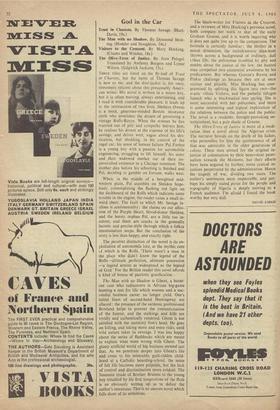God in the Car
Trust in Chariots. By Thomas Savage. (Hart- Davis, 18s.)
lhe Man with no Shadow. By Desmond Meir- ing. (Hodder and Stoughton, 16s.) The Olive-Trees of Justice. By Jean Pelegri. Translated by Anthony Burgess and Lynne Wilson. (Sidgwick Jackson, 155.)
THREE titles are listed on the fly-leaf of Trust in Chariots, but the name of Thomas Savage is new to me, and the dust-jacket is, for once, tiresomely reticent about this presumably Ameri- can writer. His novel is written in a minor key, but it is often moving, always entertaining, and I read it with considerable pleasure. It leads up to the intersection of two lives. Sheldon Owens is a meek, generous-minded Boston insurance clerk who nourishes the dream of possessing a vintage Rolls-Royce. When the woman he has married out of pity and sympathy betrays him, he realises his dream at the expense of his life's savings, and drives west, vague about his des- tination, but shedding, in his control of the regal car, his sense of human failure. Pal Forbes is a young boy with a passion for automobile engineering, struggling to lift himself, his sister and their widowed mother out of their im- poverished existence in a Chicago tenement. The mother dies before his schooling is finished and Pal, deciding to gamble on fortune, walks west.
When, in the middle of a benighted mid- western plain, Pal stumbles on Sheldon hope- lessly contemplating the flashing red light on the dashboard of the Rolls which indicates some trouble in the engine, the reader raises a small in- ward cheer, The fault to which Mr. Savage in- clines is sentimentality: the claims on our affec- tion of the Purple Heart, blood-donor Sheldon, and the heroic orphan Pal, are a little too in- sistent, and there are cracks in the generally laconic and precise style through which a folksy emotionalism seeps. But the conclusion of the story is less than happy, and exactly right.
The peculiar distinction of the novel is its ex- ploitation of automobile lore, at the mythic core of which is the Rolls. `There wasn't a man in the place who didn't know the legend of the Rolls—ultimate perfection, ultimate possession —a legend almost as widespread as the legend of God.' For the British reader this novel affords a kind of bonus of patriotic gratification.
The Man with no Shadow is Ghent, a burnt- out case who rediscovers in African big-game hunting a zest for life which women and a suc- cessful business career no longer yield. One's initial fears of second-hand . Hemingway are allayed: the presence of the sardonic professional Bowland helps to prevent the romanticisation of the hunter, and the stalkings and kills are vividly and authentically rendered. Ghent is not satisfied with the statutory lion's head. He goes on killing, and taking more and more risks, until wild nature takes its revenge. I was less happy about the series of flashbacks which are meant to explain what went wrong with Ghent. The glossy artificial world of big business seemed just that. As we penetrate deeper into Ghent's life and come to his miserable, guilt-ridden child- hood at a Catholic boarding-school, the sense of felt life becomes more palpable, but the lack of control and discrimination more evident. The Jansenist tirade of Brother Brahms to the young boy troubled by his first temptations of the flesh is so obviously written up as to defeat the author's intentions. This is an uneven novel which falls short of its ambitions. The blurb-writer for Visitors to the Crescent, and a reviewer of Miss Hocking's previous novel, both compare her work to that of the early Graham Greene, and it is worth inquiring why it does not quite live up to the comparison. The formula is certainly familiar: the thriller in a moral dimension, the melodramatic man-hunt thrown across a background of ordinary, dull urban life; the policeman troubled by pity and doubts about the justice of the law; the hunted man compelled into existential awareness by his predicament. But whereas Greene's Raven and Pinkie challenge us because they are at once vicious and pitiable, Miss Hocking has com- promised by splitting this figure into two—the manic villain Vickers, and the pathetic refugee Saneck who is blackmailed into spying. She is most successful with her policemen, and there is some interesting and topical exploration of the relations between the police and the public. The novel is a readable, thought-provoking en- tertainment, but a pale shade of Greene.
The Olive-Trees of Justice is more of a medi- tation than a novel about the Algerian crisis. The narrator broods on the death of his father, who personifies for him the quintessence of all that was admirable in the older generation of colons. These men atoned for the original in, justice of colonisation by their benevolent pater- nalism towards the Moslems, but their efforts have been negated by further, more cynical in- justices perpetrated by the administration. Hence the tragedy of war, dividing two races. The author's sentiments seem impeccable, and per- haps his simply stated pietas for the people and topography of Algeria is deeply moving .to a French audience. I'm afraid I found the book worthy but very dull. DAVID LODGE'










































 Previous page
Previous page